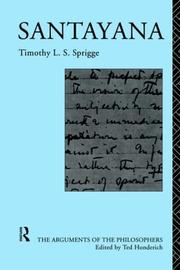| Listing 1 - 10 of 15 | << page >> |
Sort by
|
Book
ISBN: 9051663315 Year: 1993 Volume: 69 Publisher: Delft Eburon
Abstract | Keywords | Export | Availability | Bookmark
 Loading...
Loading...Choose an application
- Reference Manager
- EndNote
- RefWorks (Direct export to RefWorks)
Philosophy and religion --- Religion --- Philosophie et religion --- Philosophy --- Philosophie --- Santayana, George, --- Spinoza, Benedictus de, --- -Religion, Primitive --- Atheism --- God --- Irreligion --- Religions --- Theology --- Christianity and philosophy --- Religion and philosophy --- Spinoza, Benedictus de --- -Santayana, George --- -Contributions in the philosophy of religion --- Contributions in the philosophy of religion --- -Philosophy --- -Christianity and philosophy --- Religion, Primitive --- -Spinoza, Benedictus de, --- Ispīnūzā, --- Spinoza, Baruch, --- Spinoza, Baruch --- Espinoza, Baruch d', --- Sbīnūzā, --- Espinosa, Baruch de, --- de Spinoza, Benedictus --- Shpinozah, --- Shpinozah, Barukh, --- Spinoza, Benedict de, --- Spinoza, Benedict de --- Spinoza, Barukh, --- Spinoza, Baruch de, --- Spinoza, Benoît de, --- ספינאזא, ברוך דע --- ספינאזא, ברוך, --- שפימוזה, ברוך --- שפינאזא, בענעדיקט --- שפינאזא, ברוך --- שפינאזע, ברוך --- שפינוזא, בנדיקטוס --- שפינוזהת ברוך, --- שפינוזה, ברוך --- שפינוזה, ברוך די, --- שפינוזה, ברוך, --- שפינוזה, ב. --- سبينوزا، بندكتس
Book
ISBN: 085224455X Year: 1983 Publisher: Edinburgh Edinburgh university press
Abstract | Keywords | Export | Availability | Bookmark
 Loading...
Loading...Choose an application
- Reference Manager
- EndNote
- RefWorks (Direct export to RefWorks)
Consciousness --- Idealism --- Metaphysics --- Panpsychism --- Conscience --- Idéalisme --- Métaphysique --- Panpsychisme --- God --- Ontology --- Philosophy --- Philosophy of mind --- Animism --- Hylozoism --- Monism --- Personalism --- Positivism --- Dualism --- Materialism --- Realism --- Transcendentalism --- Apperception --- Mind and body --- Perception --- Psychology --- Spirit --- Self --- Idéalisme --- Métaphysique
Book
ISBN: 0710068239 Year: 1970 Publisher: London Routledge and Kegan Paul
Abstract | Keywords | Export | Availability | Bookmark
 Loading...
Loading...Choose an application
- Reference Manager
- EndNote
- RefWorks (Direct export to RefWorks)
Belief and doubt --- Imagination --- Semantics (Philosophy) --- Situation (Philosophy) --- Universals (Philosophy) --- Conviction --- Doubt --- Consciousness --- Credulity --- Emotions --- Knowledge, Theory of --- Philosophy --- Psychology --- Religion --- Will --- Agnosticism --- Rationalism --- Skepticism --- Universals (Logic) --- Logic --- Scholasticism --- Whole and parts (Philosophy) --- Ontology --- Relativity --- Intension (Philosophy) --- Logical semantics --- Semantics (Logic) --- Semeiotics --- Significs --- Syntactics --- Unified science --- Language and languages --- Logic, Symbolic and mathematical --- Logical positivism --- Meaning (Psychology) --- Philosophy, Modern --- Semiotics --- Signs and symbols --- Symbolism --- Analysis (Philosophy) --- Definition (Philosophy) --- Imagery, Mental --- Images, Mental --- Mental imagery --- Mental images --- Educational psychology --- Intellect --- Reproduction (Psychology)

ISBN: 0415117518 Year: 1995 Publisher: London Routledge
Abstract | Keywords | Export | Availability | Bookmark
 Loading...
Loading...Choose an application
- Reference Manager
- EndNote
- RefWorks (Direct export to RefWorks)
Santayana, George --- Santayana, George, --- Santai︠a︡na, Dzhordzh, --- Santayana, Georgius, --- Santayana, Jorge,

ISBN: 0812692268 0812692276 Year: 1994 Publisher: La Salle Open court
Abstract | Keywords | Export | Availability | Bookmark
 Loading...
Loading...Choose an application
- Reference Manager
- EndNote
- RefWorks (Direct export to RefWorks)
Truth --- Reality --- Vérité --- Réalité --- History. --- Histoire --- James, William, --- Bradley, F. H. --- Philosophy --- Nominalism --- Pluralism --- Pragmatism --- History --- Dzhems, Uilʹi︠a︡m, --- Bradley, Francis Herbert, --- Po-lieh-te-lai, --- Pu-la-te-lei, --- Jaymz, Vīlyām, --- جىمز، وىلىام
Book
Year: 1989 Volume: 58 Publisher: Leiden : Brill,
Abstract | Keywords | Export | Availability | Bookmark
 Loading...
Loading...Choose an application
- Reference Manager
- EndNote
- RefWorks (Direct export to RefWorks)
Book
ISBN: 1474472818 Year: 2009 Publisher: Edinburgh : Edinburgh University Press,
Abstract | Keywords | Export | Availability | Bookmark
 Loading...
Loading...Choose an application
- Reference Manager
- EndNote
- RefWorks (Direct export to RefWorks)
When Timothy Sprigge's The Vindication of Absolute Idealism appeared in 1983 it ran very much against the grain of the dominant linguistic and analytic traditions of philosophy in Britain. The very title of this work was a challenge to those who believed that Absolute Idealism fell with the critiques of Bertrand Russell and G. E. Moore at the beginning of the 20th century. Sprigge, however, saw himself as providing an underrepresented position in the philosophical spectrum rather than as advocating an abandoned view. For him, idealism did not fall at any determinate point in the history of philosophy. The truth of any philosophical thesis cannot depend on what happens to be currently fashionable, but rather must stand on the soundness of philosophical argument. To this end, The Vindication of Absolute Idealism is a bold statement of his conclusions, a synthesis of panpsychism and absolute idealism, which he contends is the most satisfactory solution to the question of the nature of consciousness and the mind-body problem. Sprigge's view of consciousness remains a challenge to mainstream physicalism and a viable option that addresses pressing contemporary concerns not only in metaphysics and philosophy of mind but also in environmental ethics and animal rights.
Book
ISBN: 0140221670 Year: 1984 Publisher: Harmondsworth Penguin books
Abstract | Keywords | Export | Availability | Bookmark
 Loading...
Loading...Choose an application
- Reference Manager
- EndNote
- RefWorks (Direct export to RefWorks)
Book
Year: 1988 Publisher: Leiden Brill
Abstract | Keywords | Export | Availability | Bookmark
 Loading...
Loading...Choose an application
- Reference Manager
- EndNote
- RefWorks (Direct export to RefWorks)
Book
ISBN: 9780367502690 Year: 2020 Publisher: London : Routledge,
Abstract | Keywords | Export | Availability | Bookmark
 Loading...
Loading...Choose an application
- Reference Manager
- EndNote
- RefWorks (Direct export to RefWorks)
Originally published in 1988, this landmark study develops its own positive account of the nature and foundations of moral judgement, while at the same time serving as a guide to the range of views on the matter which have been given in modern western philosophy. The book addresses itself to two main questions: Can moral judgements be true or false in that fundamental sense in which a true proposition is one which describes things as they really are? Are rational methods available in ethics which can be expected to produce convergence on shared moral views on the part of those who use them intelligently?
| Listing 1 - 10 of 15 | << page >> |
Sort by
|

 Search
Search Feedback
Feedback About UniCat
About UniCat  Help
Help News
News